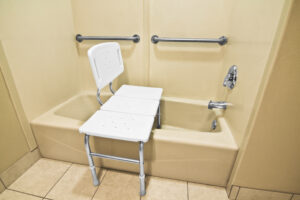February 28, 2024
Today, an estimated 80% of people with dementia are being cared for in their homes.1 In most of these cases, their caregivers are friends and relatives. About one-quarter of dementia caregivers provide care for both an aging parent and children under the age of 18.1
If you are caring for a parent with dementia at home, it helps to have a plan and routine that works with everyone in your household. Taking care of yourself is also extremely important, as good self-care can help you maintain your energy, as well as your physical health and mental well-being.
Here are 10 tips on how to be a great caregiver for a parent with dementia who is living in your home.
1. Educate yourself and your household on dementia
A dementia diagnosis can be difficult to cope with, especially in the beginning. However, taking the time to learn about this disease can help you prepare for its future stages and what’s to come.
Spend some time reading about dementia and its symptoms. Dementia progresses slowly in stages. During each stage of dementia, you may notice new symptoms.
Ask your healthcare provider for materials or pamphlets you can read at home and share with other members of your household. Or, look online for resources that can help you prepare. The better you understand dementia, the better you can navigate it with your loved one.2
 2. Establish a daily routine
2. Establish a daily routine
Confusion, forgetfulness, and poor memory are symptoms of dementia that can make your parent feel anxious and stressed from day to day. However, a daily routine can provide them with a sense of familiarity and help them know what to expect. A routine can make your parent feel more confident and independent while managing dementia.
Establish a solid daily routine with your parent. Make sure they wake up and go to bed at the same time every day. Serve healthy meals at designated times and help them manage their medications. A routine can go a long way toward keeping things orderly in your household while caring for a parent with dementia at home.
3. Buy practical clothing
Muscle weakness and loss of coordination are other common symptoms of dementia.3 These symptoms can make it difficult for your parent to get dressed, especially if they wear clothing with lots of buttons or buckles.
Take them shopping for practical, comfortable clothing that is easy to put on and take off. Buy slip-on shoes without shoelaces or shoes with velcro. Practical clothing may help you avoid frustrations related to getting dressed, using the restroom, and putting on shoes.
 4. Use assistive devices
4. Use assistive devices
People with dementia are often at greater risk of falling due to poor balance and coordination and not paying attention to certain hazards. Placing assistive devices in your home can help your parent get around more easily and reduce the risk of falls.
Place a sturdy shower chair in your shower so your parent can sit down while bathing. Install handrails along stairs and next to toilets. You can also buy a cane or walker to help your parent navigate your home.
5. Be patient with memory problems and forgetfulness
During the later stages of dementia, your parent may forget important details, including your name and face. They may also repeat questions several times and forget to do simple tasks like turning off lights and closing doors.
Keep in mind that these are common symptoms of dementia. Remind yourself to be patient with your parent at all times. Your frustration may cause these situations to escalate, and your parent may become more agitated as well.
 6. Display familiar objects and photos in your home
6. Display familiar objects and photos in your home
If your parent has moved into your home, place and display a number of their personal belongings in every room. This can help them feel more secure as they cope with progressing symptoms of dementia.4
Hang photographs and family portraits on the wall, and put their favorite knick-knacks and other objects where they can see them throughout the day. These objects can also remind your parent of where they are and who they are with at times when they’re experiencing forgetfulness. You can also use these items as distractions at times when your parent is struggling with word choice and communication.4
7. Engage your parent in various activities
Keeping your parent physically and mentally active may help slow down the progression of dementia and reduce its symptoms.5
Involve your parent in activities such as cooking, baking, and gardening. Invite them to play card games or board games. Play music and encourage them to dance. Go on walks together, and include them in family outings. Schedule a variety of activities like these into your parent’s routine to keep them occupied and potentially improve their condition.
8. Safety-proof your home
Using assistive devices is just one thing you can do to make your home more safe for a parent with dementia. However, there are lots of little other things you can do to safety-proof your home and reduce the risk of falls and other accidents.
Remove small or slippery floor rugs, or buy special rug tape that makes them adhere strongly to flooring. Tie loose electrical cords and wires away from walkways. Remove clutter from walkways as well to prevent falls.
Also, make sure all rooms are well-lit, including stairs, and keep household cleaning products locked away. This can prevent your parent from mistaking toxic household products for beverages and cooking ingredients.
 9. Hire respite care
9. Hire respite care
Caring for a parent with dementia can be draining, stressful, and overwhelming at times. If you need a short-term break or want to treat yourself to a vacation, consider hiring respite care.
Respite care is a service that provides short-term relief to caregivers like yourself.6 You can hire a professional caregiver to provide this service or ask your closest friends and relatives to step in and help out while you take a break.
Respite care may be covered by your health insurance provider. Even if it’s not, respite care can allow you to resume your caregiving duties later on, feeling refreshed, more patient, and more energetic.
10. Practice good self-care
Taking care of your mental and physical well-being is more important than ever when you are a caregiver. Ways to practice good self-care include exercising regularly, eating healthy foods, and getting plenty of quality sleep. All these behaviors contribute to good physical and mental health and will give you lots of energy.
Keep up on your wellness and doctor’s appointments, and ask for help when you need it. Continue to do your favorite hobbies and activities in your spare time.
If you need extra support as a caregiver, consider joining a support group for family caregivers. This could expose you to people just like yourself who are caring for a parent with dementia at home. You might also learn other great tips related to caregiving and self-care.
To receive treatment for any medical condition, including dementia, Request an appointment with Healthcare Associates of Texas today. We offer a variety of primary care services, including wellness exams, screenings, and more.
References
- Caregiving for a Person with Alzheimer’s Disease or a Related Dementia. (2023, June 30). Centers for Disease Control and Prevention. https://www.cdc.gov/aging/caregiving/alzheimer.htm
- Dementia Road Map: A guide for family and care partners. (n.d.). Washington State Department of Social and Health Services. https://www.dshs.wa.gov/sites/default/files/ALTSA/stakeholders/documents/AD/Dementia%20Road%20Map%20-%20A%20Guide%20for%20Family%20and%20Care%20Partners.pdf
- (n.d.). National Institute of Neurological Disorders and Stroke. https://www.ninds.nih.gov/health-information/disorders/dementias
- Tips for Caregivers and Families of People With Dementia. (n.d.). Alzheimers.gov. https://www.alzheimers.gov/life-with-dementia/tips-caregivers
- Can I Prevent Dementia? (n.d.). Alzheimers.gov. https://www.alzheimers.gov/life-with-dementia/can-i-prevent-dementia
What is Respite Care? (2023, October 12). National Institute on Aging. https://www.nia.nih.gov/health/caregiving/what-respite-care
DISCLAIMER
The information featured in this site is general in nature. The site provides health information designed to complement your personal health management. It does not provide medical advice or health services and is not meant to replace professional advice or imply coverage of specific clinical services or products. The inclusion of links to other web sites does not imply any endorsement of the material on such websites.